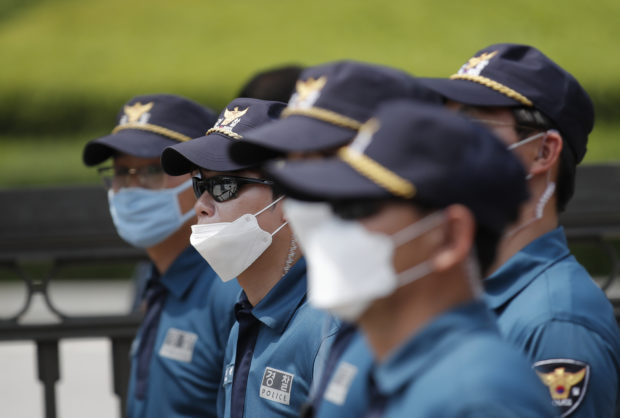MELBOURNE, Australia — Australia’s hard-hit Victoria state on Friday reported a new high of 428 cases and was moving to increase coronavirus testing, as New South Wales state announced stricter measures after a spike in new virus cases.

Police officers wearing face masks to help protect against the spread of the new coronavirus stand guard outside of the Supreme Court of Korea in Seoul, South Korea, Thursday, July 16, 2020. (AP Photo/Lee Jin-man)
Most of Victoria’s new cases and three deaths reported on Friday were in the nation’s second-largest city, Melbourne, which has been locked down since last week and where authorities hope the new restrictions will soon result in the infection count plateauing.
Victoria Premier Daniel Andrews said only five of the new cases were in regional parts of the state not in lockdown.
Andrews said the government was increasing the number of testing sites outside Melbourne. There are currently 50 testing sites in regional Victoria.
In Australia’s most populous state, New South Wales, eight new cases were detected.
New South Wales Premier Gladys Berejiklian said customer limits currently imposed on pubs would be extended to restaurants, cafes, clubs and other hospitality venues from next Friday. Bookings will be limited to 10 people.
Weddings and corporate events will be limited to 150. Funerals and religious services will be limited to 100.
The state’s largest cluster began in a Sydney pub and was caused by a Melbourne visitor who attended a work-related party there on July 3. Around 42 cases have since been linked to the Crossroads Hotel cluster.
Other parts of Australia are relaxing restrictions. The Northern Territory on Friday opened its borders to everyone in Australia apart from Sydney and Victoria state, where Melbourne is located. Travelers from those restricted places must isolate in a hotel for 14 days.
Western Australia state, which is free of community-spread COVID-19, on Thursday hosted the largest public event since the pandemic began when more than 22,000 spectators watched an Australian rules football match at Perth Stadium. Medical groups condemned the match as dangerous to public health.
In other developments in the Asia-Pacific region:
— India crossed 1 million coronavirus cases on Friday, prompting concerns about its readiness to confront an inevitable surge that could overwhelm hospitals and test the feeble health care system.
A surge of 34,956 cases in the past 24 hours took the total to 1,003,832. The Health Ministry also reported a record 687 deaths for a total of 25,602. The grim milestone comes at a time when several Indian states are imposing focused lockdowns to stem the outbreak amid frantic efforts by local governments to protect the economy.
— South Korean health officials were optimistic the country’s COVID-19 outbreak is coming under control despite a spike in infections tied to international arrivals.
Senior Health Ministry official Yoon Tae-ho said the spread of the coronavirus was clearly stabilizing in the Seoul metropolitan area and other major cities, where transmissions had spiked since late May.
South Korea’s Centers for Disease Control and Prevention still reported 60 new cases, including 39 linked to people arriving from abroad.
The country is enforcing two-week quarantines on all people arriving from abroad. The government plans to airlift more South Korean workers next week from Iraq where an outbreak has been growing. Health authorities have confirmed 34 cases among some 100 construction workers who returned earlier this week.
— China reported a domestic transmission of the coronavirus in the far northwestern region of Xinjiang, which has seen little impact from the pandemic.
Nine other new virus cases announced Friday were imported. A regional Communist Party newspaper said party officials had called for the strictest measures to be used to control any outbreak.
Measures ordered in Urumqi, the Xinjiang capital, included isolation of all who had direct contact with those infected and electronic surveillance to uncover anyone else who might have contracted the virus. Xinjiang is the homeland of the Uighur Muslim ethnic minority and has long been blanketed with an extreme level of security. China defends the checkpoints, electronic surveillance and other steps as a crackdown on terrorism,
though people who live there and their families have described oppressive state control of religious identity and family life. China has reported 4,634 deaths among 83,622 cases of COVID-19. Over 350 people remain in treatment or isolation.